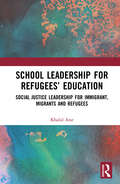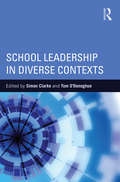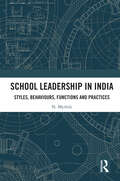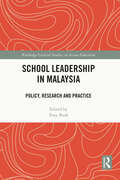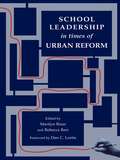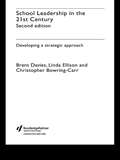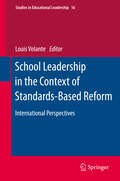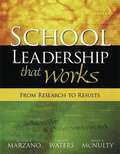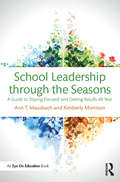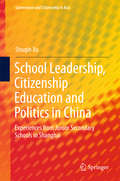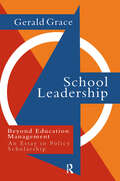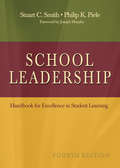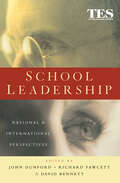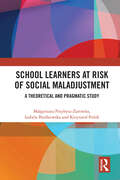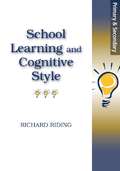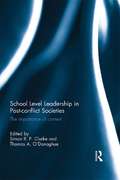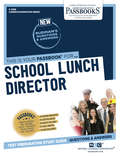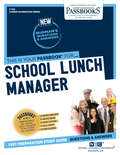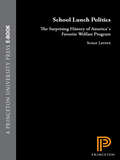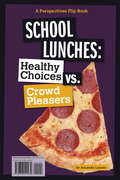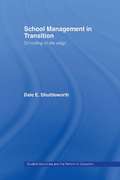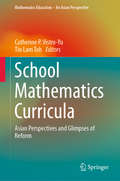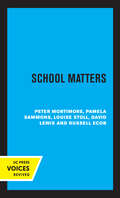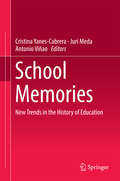- Table View
- List View
School Leadership for Refugees’ Education: Social Justice Leadership for Immigrant, Migrants and Refugees
by Khalid ArarSchool Leadership for Refugees’ Education examines how educational leaders shape and lead different practices to meet refugee students' educational needs, while also considering issues of equity and social justice. It presents cutting-edge theoretical understanding and rich first-hand research findings, which point out the local idiosyncrasies and cross-national themes involved in leading welcoming schools for newcomers. The book provides a global analysis of policy guidelines and up-to-date research findings concerning refugee education. Vast populations have been forced to leave their homelands in recent years due to war, political conflict and economic collapse. The countries that provide sanctuary need to ensure quality education that will allow these destitute but hopeful children to build a new future. Through this book a comprehensive model is presented to guide culturally relevant educational leadership to welcome newcomers in their schools and society. This book will be of great interest for academics, researchers, and postgraduate students in the fields of educational leadership, social justice education and educational administration.
School Leadership in Diverse Contexts
by Simon Clarke Tom O'DonoghueSchool Leadership in Diverse Contexts demonstrates the centrality of context to understanding school leadership. It offers varied portrayals of leadership in a diverse range of distinct settings. Each chapter highlights the prominence of context in understanding the realities of school leadership, focusing on issues and influences that school leaders face, strategies school leaders adopt to deal with the complexities of their work, and conceptualisations of school leadership relevant to the context. An impressive array of international experts examine this neglected area of research by considering school leadership in nine heterogeneous contexts, providing rich and varied portrayals of school leadership and suggesting ways in which the leadership may be enhanced. School Leadership in Diverse Contexts is an ideal book for undergraduate and postgraduate students, particularly those studying units in educational leadership, comparative education and educational policy. Similarly undergraduate and postgraduate students engaged with development studies, history, sociology, law, human geography will be attracted to this text.
School Leadership in India: Styles, Behaviours, Functions and Practices
by N. MythiliThis book explores how school leadership plays a significant role in addressing the issues of poor learning among students in India. It presents in-depth discussions on critical leadership practices that are influenced by the interaction between leadership styles, functions, behaviours and practices of school leaders using theoretical discourse. Besides, a conceptual framework is developed to understand the leadership phenomenon in the Indian context for the overall improvement of schools, student learning and self-development of leaders. While highlighting the issues and challenges faced by schools and school leaders, the book presents a number of vignettes created from the data on various aspects of school leadership practices indicating the styles, behaviours and functions in every chapter. The nature of the analysis is also unique to the discourse on educational leadership as it culminates in tracing the path traversed by the school leaders. The analysis is thematically organised into purpose-process-outcome that spreads across seven chapters. Besides the rigour of vast data that substantiates the arguments using mixed methods, it also vividly discusses the national initiatives undertaken in India to transform instructional and pedagogical leadership of principals and improve students learning in the past one decade or so.The book will be of interest to researchers of education, leadership education and development and school education in university departments of education, management, public administration, development studies and sociology that use interdisciplinary approaches. It will also be useful for school educators, academicians, school leaders, policymakers and teacher educators not only for teaching and research but also for school leadership development for practitioners.
School Leadership in Malaysia: Policy, Research and Practice (Routledge Critical Studies in Asian Education)
by Tony BushThis new book provides a comprehensive overview of school leadership in Malaysia, at a time when effective leadership is widely recognised to be an essential component of successful schools. It is also timely because leadership is regarded as a vital element in the Government’s ambitious educational reform agenda. The book is edited by a world leader in this field and includes contributors with deeply embedded understanding of the Malaysian schools’ context, based on engagement with policy, practice and research. The book addresses major aspects of school leadership, including instructional and distributed leadership, the role of the principal, the work of senior and middle leaders, professional learning communities, leadership and student outcomes, and leadership preparation. This book is essential reading for postgraduate students and researchers interested in educational leadership and management, and school reform, in an Asian context. It is also recommended for school leaders wishing to engage with policy, practice and research.
School Leadership in Times of Urban Reform (Topics In Educational Leadership Ser.)
by Rebecca Barr Marilyn BizarDeveloped in response to the growing interest in examining individual schools as they undergo change, this book features eight case studies of urban elementary and high schools as they face problems and attempt to find solutions in their quest to reform themselves. The cases, with all their pitfalls and problems, provide examples of the very bumpy road of change and of the individual school cultures that sometimes support and often impede reform. Told in the individual voices of various school leaders, the narratives reflect the inevitable biases of people immersed in their work. Their richness derives from the passion with which these stories are told. Textured and complex, these chronicles invite readers to think deeply about the many layers involved in the process of changing schools. School Leadership in Times of Urban Reform is a powerful text for courses in educational leadership, school reform, and the politics of education. Engaging pedagogical features at the end of each case facilitate its use: *Each case ends with an "Analysis of Leadership" section and "Extended Thinking" questions and activities. *Sections 2-5 conclude with "Reflections" to help the reader uncover the major themes and issues. Section 1 is an introductory analysis of reform and school leadership; it provides a frame of reference for examining the case studies that follow. Sections 2-5 are organized around eight case studies (two per section) that address questions of how the leadership roles of school principals and teachers have been shaped by the reform initiative; how parents and local communities have contributed to school reform; and how the culture of the school, and teaching and learning, have been shaped by reform. The final section synthesizes and analyzes what the authors have learned through these cases concerning the leadership roles of principals, parents, community members, and teachers during the period of reform; how the cultures of schools changed as reform progressed; and how reform impacted the instructional practices of teachers and the learning of students.
School Leadership in the 21st Century
by Brent Davies Christopher Bowring-Carr Linda EllisonEducation reform continues to be a dominating feature of education in the UK and many other countries throughout the world. As a result of this, it is now more important than ever that headteachers and school managers develop the skills which enable them to manage their new responsibilities effectively. In School Leadership in the 21st Century all the major aspects of school leadership are discussed, including: the strategic and ethical dimensions of leadership leading and managing change leading and managing staff in high performance schools information for student learning and organisational learning transformation of schools in the tewnty-first century. The authors of this completely updated and revised edition have addressed the new standards and competency frameworks, making this an essential read for all headteachers and aspiring headteachers on NPQH or LPSH courses and anyone else with an interest in school leadership.
School Leadership in the Context of Standards-Based Reform
by Louis Volante"Although standards-based reform emerged in the United States and the United Kingdom, the idea has spread across the world, as an approach to systemic reform. It might appear that there is a world-wide "tsunami" of standards-based reform that will standardize and homogenize the educational system across the globe. This volume makes it very clear, however, that there is no one approach to standards-based reform and countries change - there is a danger in paying attention to its evolution and impact in only one context. That's what makes this volume so valuable. Louis Volante has drawn together descriptions from a wide range of countries, all involved in large-scale reform and using standards and assessments as part of their process. What becomes very obvious is that the language may be the same but the words reflect different contexts and can represent very different ideals, values, and processes. I'm sure you will find this book as interesting and challenging as I have - a gem that pushes your thinking and does not allow readers to remain neutral." (Lorna Earl)
School Leadership that Works: From Research to Results
by Robert J. Marzano Timothy Waters Brian A. McnultyWhat does research tell us about the effects of school leadership on student achievement? What specific leadership practices make a real difference in school effectiveness? How should school leaders use these practices in their day-to-day management of schools and during the stressful times that accompany major change initiatives? Robert J. Marzano, Timothy Waters, and Brian A. McNulty provide answers to these and other questions in School Leadership That Works.
School Leadership through the Seasons: A Guide to Staying Focused and Getting Results All Year
by Ann T. Mausbach Kimberly MorrisonThis book offers key tools and tactics that help school leaders navigate the complex and busy work of improving a school, allowing them to maintain success during the full calendar year. Through practical guidance and "Have to Do" strategies, School Leadership through the Seasons breaks down the challenges of leading a school into manageable steps that align with the seasons of the year. After reading this book, you’ll be able to: implement school improvement processes at high levels, build a culture and climate that promotes safety and learning, and respond to student and staff needs.
School Leadership, Citizenship Education and Politics in China
by Shuqin XuThis book examines and theorizes the dynamics and complexities of leadership in citizenship education in junior secondary schools in Shanghai, China. Specifically, it examines from a macro- and micro-political theoretical perspective the interactions between principals and school party secretaries (SPSs), and how they respond to the demands of macro- and micro-political actors. This qualitative empirical research found four major school leadership/citizenship education scenarios in which principals and SPSs addressed the interests of different macro- and micro-political actors. Moreover, principals and SPSs enjoyed a complicated working relationship at the micro-political (school) level in which they collaborated to fulfill their responsibilities and respond to school macro- and micro-political actors, while competing for power over leadership in citizenship education. Principals' and SPSs' leadership in citizenship education was shaped by inter-related factors, including diverse influences in a multi-leveled world, the integration of politics and education, the demands of macro- and micro-political actors, and personal factors. To interpret these findings, this study proposes a theoretical framework for understanding leadership in citizenship education in China as a political exercise. This theoretical framework is useful for understanding the complexity of school and citizenship education leadership, the micro-political relationship between Chinese principals and SPSs, and their dynamic and complex interactions with macro- and micro-political actors.
School Leadership: Beyond Education Management
by Gerald Grace Professor Gerald GraceThis text provides a study of the education policy scholarship of leadership. It examines the ways in which concepts of educational leadership and management have evolved historically and culturally, reviewing contemporary debates about the nature of school leadership.; The question of what school leadership could and should be is at the centre of political, ideological and educational debate in many societies. These debates involve cultural conservatives, New Right marketeers, democrats and community educators, feminists and critical theorists as well as school governors, headteachers and teachers, parents, community members and school students.; These debates are reviewed and the theoretical context is illuminated by fieldwork accounts derived from the research participation of 88 headteachers working in English schools, both primary and secondary. Such accounts provide an insight into the challenges of contemporary school leadership as headteachers face new power relationships, new curriculum responsibilities and management and marketing cultures which generate moral, ethical and professional dilemmas for many of them.
School Leadership: Handbook for Excellence in Student Learning
by Stuart C. Smith Philip K PieleEmphasizing the school leader's role in student learning, this new edition covers the principalship, accountability, leadership effects, distributed leadership, political leadership, resource allocation, and more!
School Leadership: National and International Perspectives (School Leadership And Management Ser.)
by David Bennett John Dunford Richard FawcettThis work challenges the notion that there is "one right way" to approach school leadership. Presenting key policies and approaches to organization and management of 14 school leaders from the UK and internationally, it seeks to reflect the diversity of approaches possible in given situations.
School Learners at Risk of Social Maladjustment: A Theoretical and Pragmatic Study
by Małgorzata Przybysz-Zaremba Izabela Bieńkowska Krzysztof PolokThis book is a valuable didactic help (school teachers, guardians, and parents included) for those who wish to understand the specifics of education better and for students of pedagogical and psychological faculties who plan to work with young people in various educational institutions.This volume examines the problems and challenges of social maladjustment at school from a theoretical and practical perspective – it not only aims to present the latest scientific research on students at risk of social maladjustment (as well as those socially maladjusted) but also proposes strategies and methods of working with those a-ected by it. In nine chapters focusing on various aspects of social maladjustment in school, the authors use their professional and scientific experience to present practical tips and suggestions for teachers, therapists, and pedagogues suggesting preventive actions to counteract pathological phenomena in schools.This book will be useful for all those professionally involved in the fields of education, psychology, sociology, remote work, and/or studies on child and youth development. It could also be an invaluable companion to policy-makers and professionals from government and nongovernment organizations working towards inclusive education and social development. Additionally, it will serve as a compendium of guiding methods for problems encountered in professional work.
School Learning and Cognitive Styles
by Richard RidingThis book provides an accessible approach to teaching strategies that will improve the quality of student learning and behavior. The author advocates that the key to effective learning, and therefore the key to a successful school, is not complex management systems but good quality teaching. With this aim clearly in sight he incorporates recent psychological developments on individual learning differences with practical classroom applications. He presents new approaches in three key areas: processing capacity, cognitive style and understanding the structure of knowledge. These are central to the understanding of pupil differences. They affect our perception of how pupils can be helped to learn, why pupils find some aspects of their schoolwork difficult, and why pupils behave as they do. With simple explanations and practical activities this book will help both primary and secondary teachers to improve pupils learning and help them to manage behavior more effectively. The new insights into difficult behavior will also be of interest to counselors and educational psychologists.
School Level Leadership in Post-conflict Societies: The importance of context
by Simon R. P. Clarke and Thomas A. O’DonoghueHow do different contexts influence the nature and character of school leadership? This book is predicated on the simple, yet profound, observation that school leadership can only be understood within the context in which it is exercised. The observation is particularly valid in relation to post-conflict societies especially when they have eventuated from new-wars. Schools in these contexts face highly complex circumstances and a level of environmental turbulence requiring different kinds of leadership from those operating in less complicated and relatively stable situations. By assembling an impressive array of international experts, this book investigates a much neglected area of research. Each chapter highlights the importance of context for understanding the realities of school leadership, and reveals the challenges and influences that school leaders face as well as the strategies they adopt to deal with the complexities of their work. In particular, valuable insights are provided into how intractable problems faced by schools can affect student, professional and organizational learning agendas. There are also important glimpses of the progression that can be made in schools by: -Enhancing the curriculum -Energizing teaching capacity; and -Optimising leadership capacity. Depictions of post-new war environments include Angola, Ghana, Sri Lanka, Rwanda, Kenya, Solomon Islands, Lebanon, Kosovo, Timor-Leste and Northern Ireland. The book will be key reading for undergraduate and postgraduate students studying educational leadership, comparative education and education policy.
School Lunch Director: Passbooks Study Guide (Career Examination Series)
by National Learning CorporationThe School Lunch Director Passbook® prepares you for your test by allowing you to take practice exams in the subjects you need to study. It provides hundreds of questions and answers in the areas that will likely be covered on your upcoming exam, including but not limited to: Food sevice managment principles and practices; Menu planning principles and practices; Proper food preparation and serving techniques; Sanitary food handling and storage practices; Nutrition and dietetics and other related areas.
School Lunch Manager: Passbooks Study Guide (Career Examination Series)
by National Learning CorporationThe School Lunch Manager Passbook® prepares you for your test by allowing you to take practice exams in the subjects you need to study. It provides hundreds of questions and answers in the areas that will likely be covered on your upcoming exam, including but not limited to: food service management principles and practices; food preparation and service; sanitary food handling; purchasing; storage; and other related areas.
School Lunch Politics: The Surprising History of America's Favorite Welfare Program
by Susan LevineWhether kids love or hate the food served there, the American school lunchroom is the stage for one of the most popular yet flawed social welfare programs in our nation's history. School Lunch Politics covers this complex and fascinating part of American culture, from its origins in early twentieth-century nutrition science, through the establishment of the National School Lunch Program in 1946, to the transformation of school meals into a poverty program during the 1970s and 1980s. Susan Levine investigates the politics and culture of food; most specifically, who decides what American children should be eating, what policies develop from those decisions, and how these policies might be better implemented. Even now, the school lunch program remains problematic, a juggling act between modern beliefs about food, nutrition science, and public welfare. Levine points to the program menus' dependence on agricultural surplus commodities more than on children's nutritional needs, and she discusses the political policy barriers that have limited the number of children receiving meals and which children were served. But she also shows why the school lunch program has outlasted almost every other twentieth-century federal welfare initiative. In the midst of privatization, federal budget cuts, and suspect nutritional guidelines where even ketchup might be categorized as a vegetable, the program remains popular and feeds children who would otherwise go hungry. As politicians and the media talk about a national obesity epidemic, School Lunch Politics is a timely arrival to the food policy debates shaping American health, welfare, and equality.
School Lunch: Unpacking Our Shared Stories
by Lucy SchaefferBought or brought? Revisit the nostalgia of the school cafeteria with this collection of interviews, vivid portraits, and elaborately reimagined food photos.Food often unites us in unexpected ways -- especially on Taco Salad Day. Drawing on material from more than seventy voices , these stories capture all walks of life -- from celebrities and chefs to a circus family, new immigrants, a creative dad whose illustrated lunch bags went viral, plenty of unlikely cultural mashups, and one genuine cafeteria lady. Their experiences are compelling, familiar, and foreign at the same time, forming a cultural time capsule. School Lunch celebrates our diversity and our shared experience. In their words:"School lunch is one of the core reasons I became a chef." -- Marcus Sammuelson"My mom, God rest her soul, was not exactly Mom-of-the-Year on this kind of stuff. She worked full-time, that womanwas not about to peel and slice fruit for me." -- Natalie Webster"I ate the same damn thing every day for six years." -- Micaela Walker"On the days when I didn't have enough food there was always a reason to start or finish a fight." -- George Foreman"We were definitely a crusts-on family." -- Daphne Oz"I used to hate that feeling of walking into the lunchroom for the first time and not knowing where to sit." -- Chinae Alexander"Every kid had some good item to trade and I had f****** applesauce." -- Sam Kass
School Lunches: Healthy Choices vs. Crowd Pleasers (Perspectives Flip Books: Issues)
by Amanda LanserChildhood obesity is a worsening problem across the country. Will mandating that schools serve healthier lunches help control the problem? Or should children and their parents have the right to choose and learn to make their own healthy choices? Perspectives Flip Books are like two books in one: Start from one end and learn why some people argue schools should ban junk food and serve healthier lunches. Then flip it over and discover why others argue students should make their own choices. Critical thinking questions help you analyze both perspectives and form your own opinions about the issue.
School Management in Transition: Schooling on the Edge
by Dale ShuttleworthSchool Management in Transition examines the impact of the neo-conservative political agendas which still hold sway in education. It describes the transition that has occurred in the school leader's role from teacher-administrator to quality control supervisor and how some schools have developed strategies to deal with the resulting issues.Based on a study carried out by the Organisation for Economic Cooperation and Development (OECD), the book analyzes issues such as decentralization, testing, external assessment and privatization in the education systems of nine of the world's most industrialised countries: the USA, UK, Japan, Mexico, Belgium, the Netherlands, Sweden, Greece and Hungary. It contrasts different school management models in these countries and goes on to identify innovation and best practice designed to tackle such concerns as declining professional morale, premature retirements and teacher shortages.This book provides a unique insight into what is really happening in school leadership and management, and will be of great interest to school leaders, academics, researchers and policy makers.
School Mathematics Curricula: Asian Perspectives and Glimpses of Reform (Mathematics Education – An Asian Perspective)
by Tin Lam Toh Catherine P. Vistro-YuThis book sheds light on school mathematics curricula in Asian countries, including their design and the recent reforms that have been initiated. By discussing and analyzing various problematic aspects of curriculum development and implementation in a number of East and South Asian countries and offering insights into these countries’ unique approaches to supplementing school mathematics curricula, it contributes to shaping effective policies for implementation, assessment and monitoring of curricula. The book covers a wide range of issues: curriculum design, localization of curricula, directions of curricular reforms, mathematics textbooks, assessment within the curriculum and teachers’ professional development, which are of interest to a wide international audience.
School Matters
by David Lewis Peter Mortimore Louise Stoll Pamela Sammons Russell EcobThis title is part of UC Press's Voices Revived program, which commemorates University of California Press’s mission to seek out and cultivate the brightest minds and give them voice, reach, and impact. Drawing on a backlist dating to 1893, Voices Revived makes high-quality, peer-reviewed scholarship accessible once again using print-on-demand technology. This title was originally published in 1988.
School Memories
by Cristina Yanes-Cabrera Juri Meda Antonio ViñaoThis book reveals how school memories offer not only a tool for accessing the school of the past, but also a key to understanding what people today know (or think they know) about the school of the past. It describes, in fact, how historians work does not purely and simply consist in exploring school as it really was, but also in the complex process of defining the memory of school as one developed and revisited over time at both the individual and collective level. Further, it investigates the extent to which what people know reflects the reality or is in fact a product of stereotypes that are deeply rooted in common perceptions and thus exceedingly difficult to do away with. The book includes fifteen peer-reviewed contributions that were presented and discussed during the International Symposium School Memories. New Trends in Historical Research into Education: Heuristic Perspectives and Methodological Issues (Seville, 22-23 September, 2015). "
